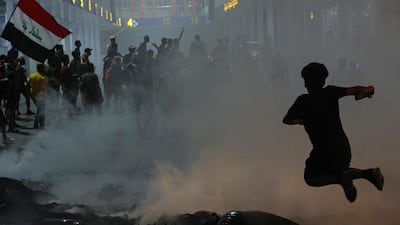An entire generation of Iraqi activists is being attacked, threatened or forced to flee the country. In many cases, they are paying with their lives for standing up against corruption and militias meddling in Iraqi affairs – many of them backed by Iran.
Ali Al Bayati, spokesman for the Iraqi Independent High Commission for Human Rights, has said, “It seems that there is a well-programmed cleansing of activists who were influential in the last protest movement.”
More than 700 unarmed demonstrators have been killed since the onset of a protest movement that has taken Iraq by storm since October. Hundreds of others were disappeared or abducted. Protest leaders have also received death threats, and many continue to be active, despite living in fear.
The identity of those responsible is an open secret. They are Iraq’s many Iran-backed militias, sometimes aided by rogue elements of Iraq’s security apparatus. In the past week alone, a new wave of targeted killings has hit the southern city of Basra; assassination attempts have been carried out against six activists, two of whom were killed.
The latest victim was Reham Yacoub, a young Iraqi woman who led women’s marches in Basra. An outspoken critic of Iraq’s ruling class and the corruption that plagues the political system, she had campaigned for basic rights such as access to clean water. She was shot on Wednesday. A friend of hers, who has now fled the country fearing for his life, has told media outlet Irfaa Sawtak that Yacoub had received death threats from Asaib Ahl Al Haq, an Iran-backed militia. Exactly five days before Yacoub’s murder, Tahseen Osama, another Basran activist, was also killed, prompting Prime Minister Mustafa Al Kadhimi to sack the city’s police chiefs. These measures failed to prevent further bloodshed.
In July, Iraqi security expert Husham Al Hashimi, an outspoken critic of Iran’s militias who was close to Mr Al Kadhimi, was also killed outside his home in Baghdad after he was threatened by Iran-backed Iraqi groups.
Too many young Iraqis fighting for a better future are being brutalised, harassed or worse. Peaceful protesters and civil society activists have the power to push for positive change, and ought to be protected at all cost. They are a beacon of hope for their nation. Months of demonstrations across southern Iraq, which was traditionally the stronghold of these militias, have brought down the former government but are unable to curb the influence of Iran-aligned groups. While Mr Al Kadhimi has pledged to hold the killers to account, and offered compensation for the families of the victims, he has been unable to reign in Iran’s powerful militias.
The killings are intended to force Iraq’s reformers to cower, but Iraq’s civic activists are determined to enforce changes to curb corruption and waste. The violence waged against the activists is in part a thinly veiled warning for the prime minister, a reformer who has vowed to defend the rule of law and is currently on an official trip to Washington. Mr Al Kadhimi needs support to deter these groups from taking more Iraqi lives and from encroaching further on the nation’s sovereignty. During his visit to Washington, he discussed energy and business deals with US President Donald Trump, who promised that Washington will be “there to help if Iran should do anything”.
American help should extend to Iraq’s civil society figures. By taking a strong stance on these targeted killings, the US and the international community can empower Mr Al Kadhimi to enact much-needed reforms, impose strict security measures and deter Iran-aligned militias from their assassination campaign. Should the world fail to do so, it will leave Iraq’s peaceful opposition movements devoid of any leaders that can build a political system that meets the aspirations of the Iraqi people.


